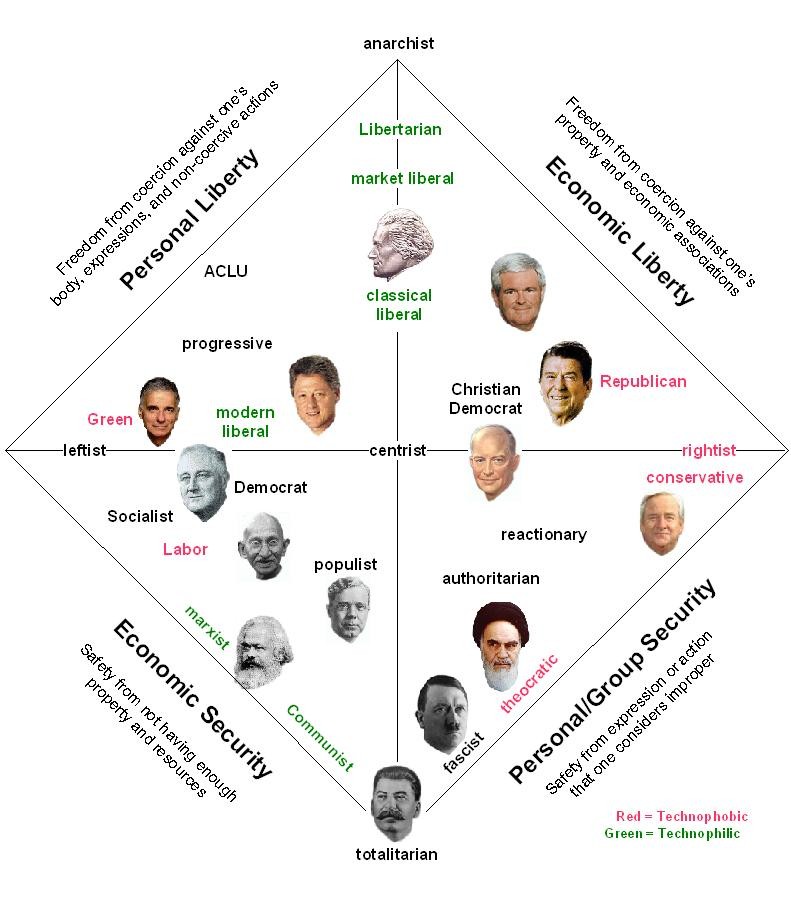@EmperorNero,
EmperorNero;83405 wrote:So what if I am an island don't want to serve the community, and merely want it to leave me alone?
Thanks.
Would someone explain me how the Nazis were right wing.
Left wing means the government having great control, which specifically is the case for the Nazis.
Right wing means the government being denied great control, the exact opposite of National Socialism.
If you define right and left differently, please elaborate.
Communism is a different flavor of the same general thing, left wing extremism (where socialism is a less extreme leftism, so your last sentence is correct, Zetetic, even if it's a detail).As for example Islamo-fascism is too.
They are all utopian visions of a perfect totalitarian society - the muslim holy state, the master race or the workers paradise.
But they are basically the same thing, in contrast to the idea of the right, where the state is denied the power.
Fascism and Marxist-Leninism grew out of the rapid industrialization and modernization Central Europe, where communities living in tightly bonded families suddenly got shattered and the sons and fathers went off to the urban areas. Young men in particular lost a sense of identity, rootedness, and personal dignity that had been provided by traditional social structures. In that vacuum, along came Hitler and Lenin, who told these young men that they had an answer for their feelings of dislocation and humiliation: You may not be in the village or small town anymore, but you are still proud, dignified members of a larger community-the working class, or the Aryan nation.
Bin Laden offered the same sort of ideological response for young Arabs and Muslims.
(From: The World is Flat.)
What are those right wing attitudes? Don't large crowds chanting "Sieg Heil" seem collectivist to you? Doesn't dying for the fatherland serve the community?
The Nazis and communists did not fight each others in one of the bloodiest clashes in human history because they are political adversaries, but because that is the nature of left wing governments.
Actually, the
justification was very much based on the political ideology of the fascists, who believed the communists had taken advantage of the condition caused by the 'injustice of liberal democracy'.
From wikipedia:
The National Socialist German Workers' Party (
Nazi Party) ruled
Germany from 1933 until 1945. After
Benito Mussolini's successful
March on Rome in 1922, German Nazi leader
Adolf Hitler grew to admire him, and soon the Nazis presented themselves as a German version of Italian Fascism.
[214][215] Joseph Goebbels, Hitler's chief
propagandist, credited Italian Fascism with starting a conflict against
liberal democracy, saying,
[INDENT] The march on Rome was a signal, a sign of storm for liberal-democracy. It is the first attempt to destroy the world of the liberal-democratic spirit[...] which started in 1789 with the
storm on the Bastille and conquered one country after another in violent revolutionary upheavals, to let... the nations go under in
Marxism,
democracy,
anarchy and
class warfare..."
[216]
[/INDENT] Following the Italians' example, the Nazis attempted a "March on Berlin" to topple the
Weimar Republic, which they characterised as "Marxist" (in reality, it was
social democratic).
[216] A month after Mussolini had risen to power, amid claims by the Nazis that they were equivalent to the Italian fascists, Hitler's popularity in Germany began to grow, and large crowds began to attend Nazi rallies. The newspaper
Berlin Lokal-Anzeiger featured a front page article about Hitler, saying "There are a lot of people who believe him to be the German Mussolini".
[214]
Now, in political science, it is often recognized that the political spectrum is in reality a continuum:

This is a bit crude, but it give the general idea. So right meets left where fascism meets communism. Fascist propaganda is often reminiscent of very strong social conservatism. A call for nationalist spirit often flows from a call for patriotism that turns rabid. The 'right' you speak of has become a hybrid of the social conservatism of the past and the current trend toward libertarian philosophy. These two facets are ultimately incompatible if one wants to make social issues part of policy. Social issues have to remain in the realm of opinion with no laws relating to them in a libertarian society.